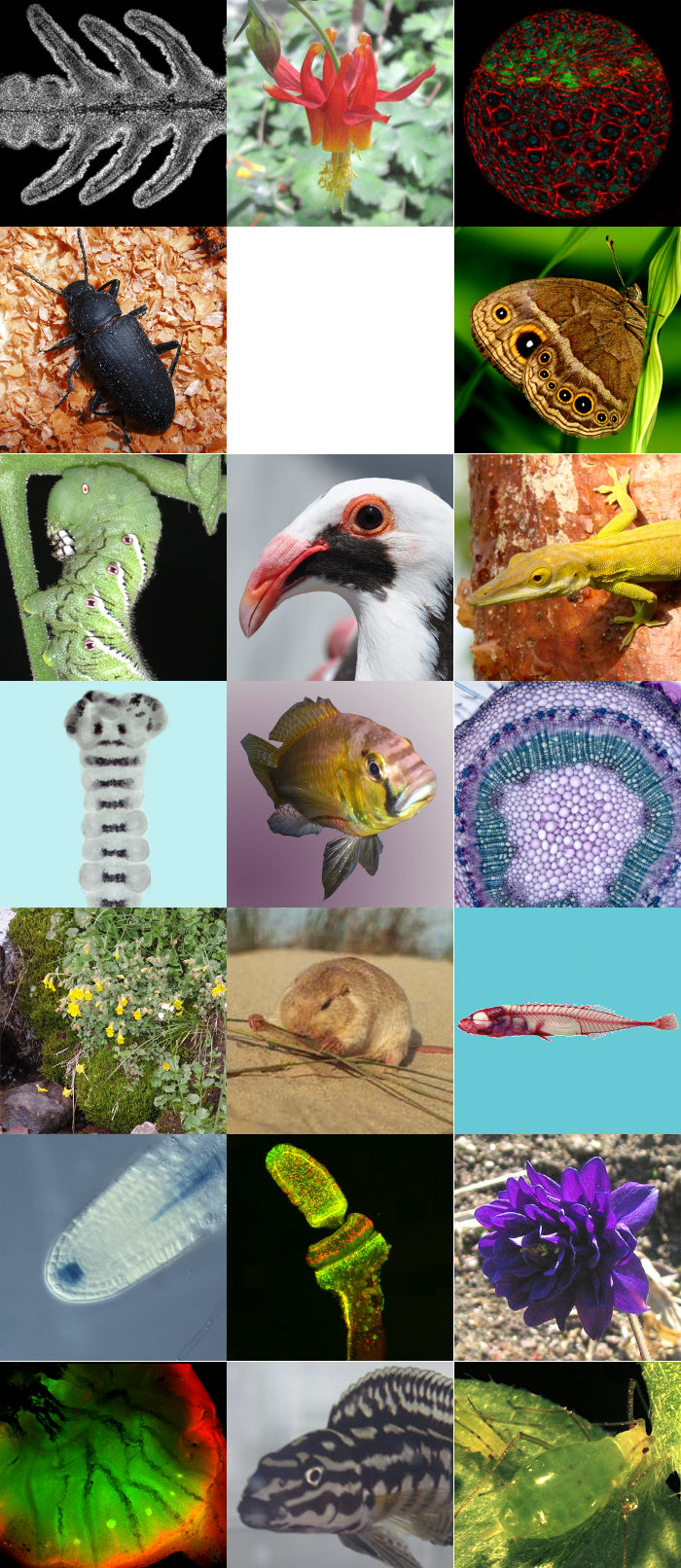SICB Annual Meeting 2013
January 3-7, 2013
San Francisco, CA
Symposium: Understanding First Order Phenotypes: Transcriptomics for Emerging Model Systems
Overview:
Gene expression, a first order phenotype, is a phenotype that reflects the interaction of the genome and the environment. Due to recent advances in technology, this first order phenotype can now be studied in an integrative, comparative and evolutionary context. In order to understand the phenotype of gene expression in an ecological, evolutionary or comparative context there are two different general approaches. The first employs the use of genetic model organisms in creative ecological contexts. The second employs the use of modern genomic tools, such as RNA-sequencing, to emerging model organisms that have had a long tradition in ecologically relevant contexts. Genomic techniques, tools and analyses, established in the genetic model organisms often require adaptations and extensions to be applied to emerging model systems.
Objectives:
We fear that the rapid advances in Next Generation Sequencing (NGS) technologies and computational algorithms have resulted in a knowledge-gap for current researchers in fields represented by S.I.C.B. Further, even though biomedical work is often well supported and computational packages exist to perform -omic analyses on species with high-quality reference genomes, there is a large community of Evolutionary and Ecological Functional Genomicists (EEFG) who work with emerging model species for which there is a deficit in both -omic primary resources (e.g. reference genomes, gene models, robust workflows) and training on how to acquire and implement those resources. It is a good time to get advice from pioneers who are using these techniques to guide and shape future application in the emerging systems.
Sponsors: DAB; DCE; DEDB; DIZ

This symposium is supported in part by an NSF-funded Research Coordination Network, “Evo-Devo-Eco Network” (EDEN; http://edenrcn.com/)(IOS-0955517).
This symposium aims to facilitate the EDEN’s overarching goal to facilitate new support networks and collaborations among labs that do not currently enjoy the large community resources of traditional model species. The EDEN participating labs are highly variable in their membership, resources, and biological questions. At the same time there is an enormous untapped potential for the exchange of techniques, ideas, and knowledge that we hope will flow not just from established models to lesser-known systems, but also from the unique biology exposed by lesser-known systems to traditional models.
Student Travel Support:
Some additional support will be available for student travel for presenters in accompanying session sessions. (http://edenrcn.com/funding/symposium.html)
Organizers
- Suzy Renn (Reed College)
- Antónia Monteiro (Yale University)
- Andrew Groover (USDA Forest Service)
- Hopi Hoekstra (Harvard University)
- Casandra Extavour (Harvard University)
Speakers (titles to be confirmed)
S4-1.1 Saturday, Jan. 5, 08:30 JONES, Corbin:
RNAseq on draft genomes; perils and pitfalls
S4-1.4 Saturday, Jan. 5, 10:30 WHEAT, Christopher W:
RNA-seq for ecologists – fundamentals and practicalities
S4-1.5 Saturday, Jan. 5, 11:00 PESPENI, M.H.:
Evolutionary and ecological genomics in a changing world: integrating Next-Gen data with environmental variation to reveal local adaptation
S4-1.6 Saturday, Jan. 5, 11:30 STAJICH, JE*; JONESON, S; ABRAMYAN, J; AHRENDT, S; RAMAMURTHY, R; SAIN, D; SHIU, SH:
Tools and pipelines for comparative genomics with application to evolution in Fungi
S4-2.1 Saturday, Jan. 5, 13:30 DUNN, CW:
The Comparative Biology of Gene Expression
S4-2.2 Saturday, Jan. 5, 14:00 FISCHER, Antje H.L.*; COSENTINO, Carlo; SMITH, Joel:
The first steps toward a Nematostella gene interaction network
S4-2.3 Saturday, Jan. 5, 14:30 HILLER , M; BEJERANO , G*:
A “forward genomics” approach links genomic and phenotypic evolution in a clade of related species


